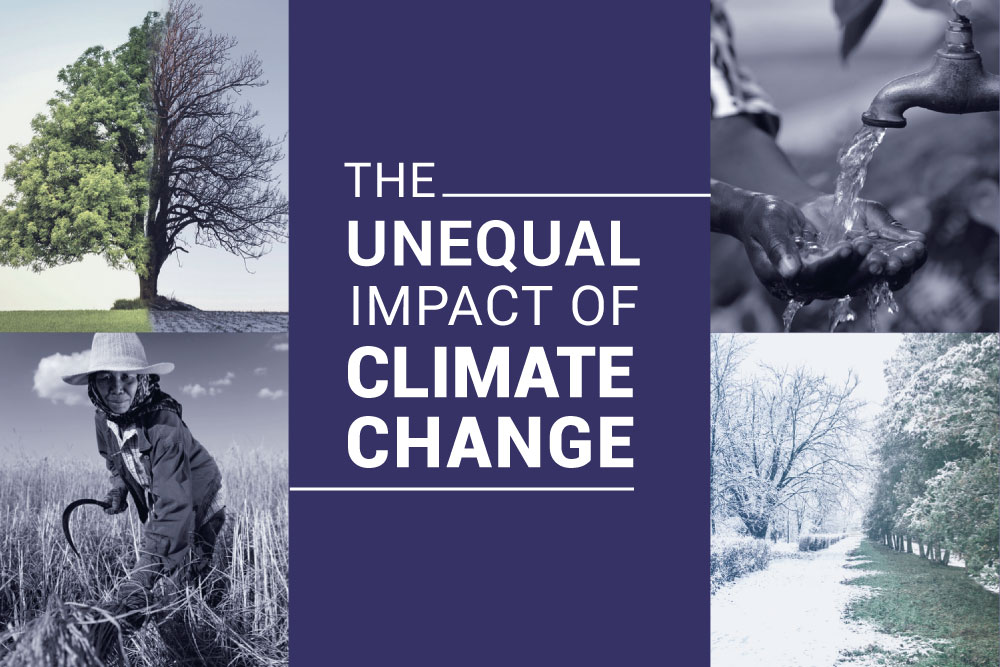
The Unequal Impact of Climate Change on Women
Women are disproportionately impacted by climate change, and other environmental, economic, or social shocks.
From job and educational opportunities, to equal pay, representation, decision making, and more, women often get the short end of the stick. And unfortunately, when it comes to climate change, or any environmental, economic, or social shock, women are disproportionately impacted, too. Why? Because it deepens these existing inequalities.
Take poverty for example
Women living in poverty often bear the brunt of the impact of climate change. That’s because climate change unequally affects the poor. And according to the United Nations, women form a disproportionately large share of the poor in countries all over the world. Those living in extreme poverty are at an even bigger disadvantage.
In developing countries, especially in rural areas, women are the primary small farmers and depend on agriculture for their livelihoods and to feed their families. Today, traditionally hot months are now cool. Rains come at different times during the year, if they come at all, making it nearly impossible for them to rely on seasonal weather for planting, harvesting, and irrigation. The devastating results of climate change, including loss of income, hunger, and displacement are hard to ignore. In fact, according to the U.N. Development Programme, across Africa, the proportion of women affected by climate-related crop changes could range from 48 percent in Burkina Faso to 73 percent in the Congo.
The impacts of climate change on women is felt in the U.S. and other industrialized nations around the world
The Natural Resources Defense Council (NRDC) found that after Hurricane Katrina in 2005, 83 percent of single mothers were unable to return home for a full two years after the storm. And it’s estimated that two thirds of jobs lost after Hurricane Katrina were lost by women. The U.S. is not alone.
These types of extreme weather events and natural disasters are becoming increasingly common worldwide, and women are more likely to suffer the consequences. According to a study by the United Nations Development Programme (UNDP), more women than men died during the 2003 European heatwave, and in France, most deaths were among elderly women. The study also found that while women are 14 times more likely than men to die during a disaster, there was a direct relationship between a woman’s risk of being killed and their socioeconomic status.
Women’s roles and responsibilities come into play, too
Existing gender-based barriers make women more vulnerable to climate change. A UNDP study on gender, climate, and food security found that although women predominate in world food production (50 to 80 percent), women own less than 20 percent of land. Across the globe, women also face barriers to accessing financial services, social capital, and technology.
According to UN Women, women remain less likely to participate in the labor market than men, are more likely to be unemployed, and are over-represented in informal and vulnerable employment. As it’s come to light during the COVID-19 pandemic, women are paid less, bear more responsibility for caring for children and family, and are less likely to have access to the same social protections as men. All of these inequalities and more are deepened when it comes to the impact of climate change.
According to the World Economic Forum, 70 percent of the world’s healthcare staff are made up of women, but only 25 percent of global leaders are female. Without women in these positions, women’s issues could fail to be addressed throughout the crisis. And the same holds true for those making climate decisions. Women are not equally represented. According to the UN Environment Programme, women’s unequal participation in decision-making and labor markets compound inequalities and often prevent them from fully contributing to climate-related planning, policymaking, and implementation.
The only way to confront the disproportionate impact of the climate crisis is to address inequality and give women an equal seat at the table. Integrated solutions that involve investing in and empowering women can directly combat climate change, fight poverty and inequality, and are key to our planet’s survival.

